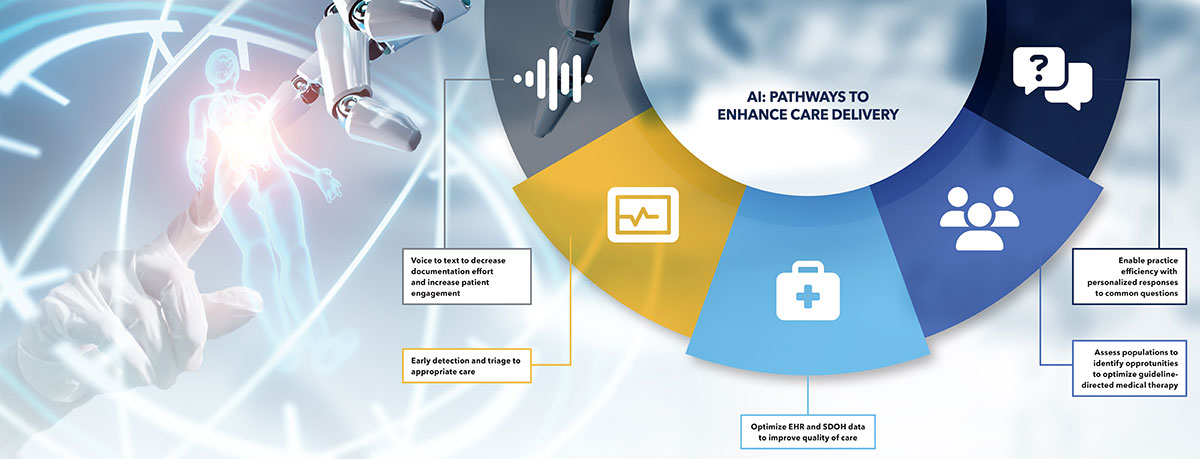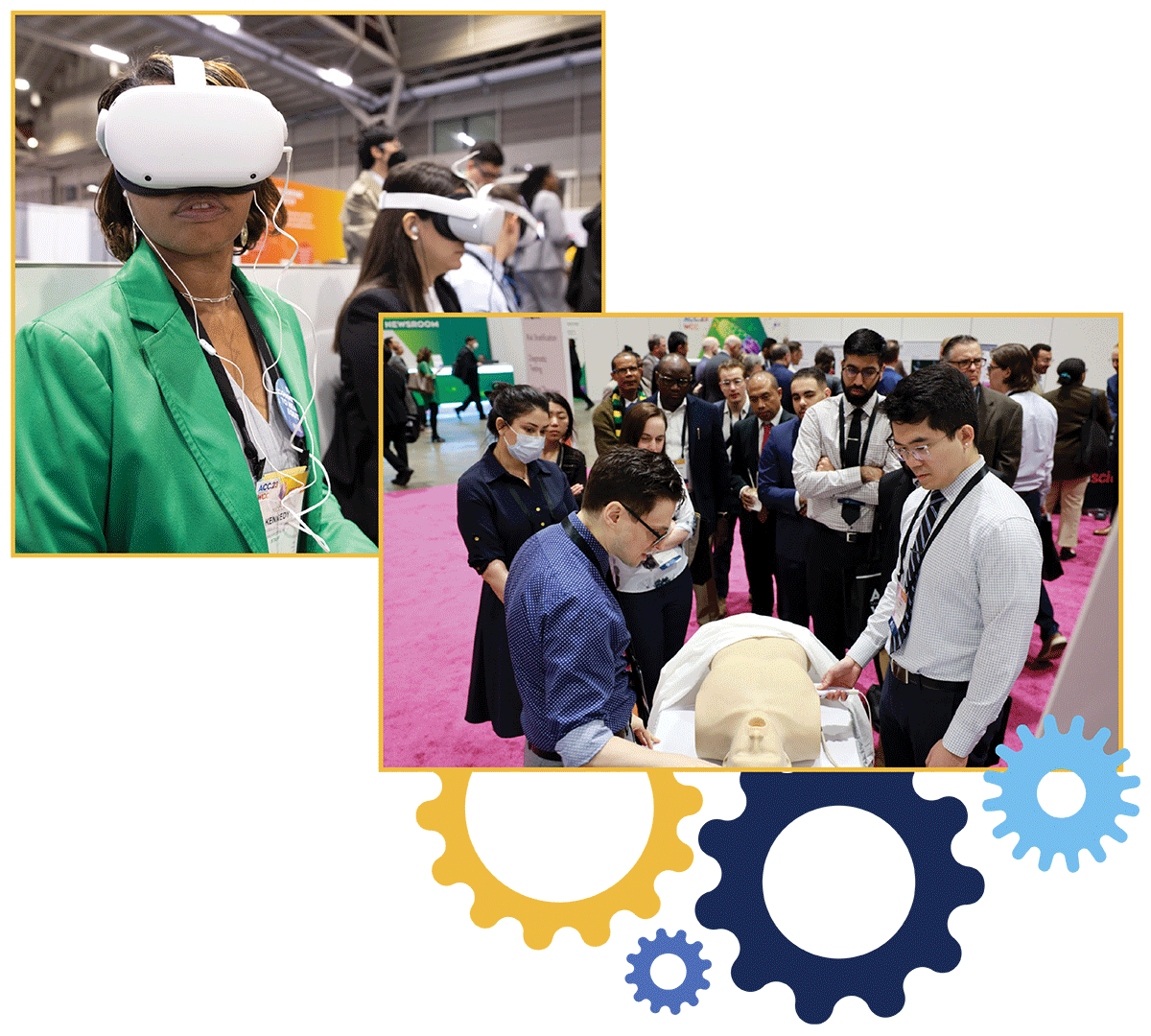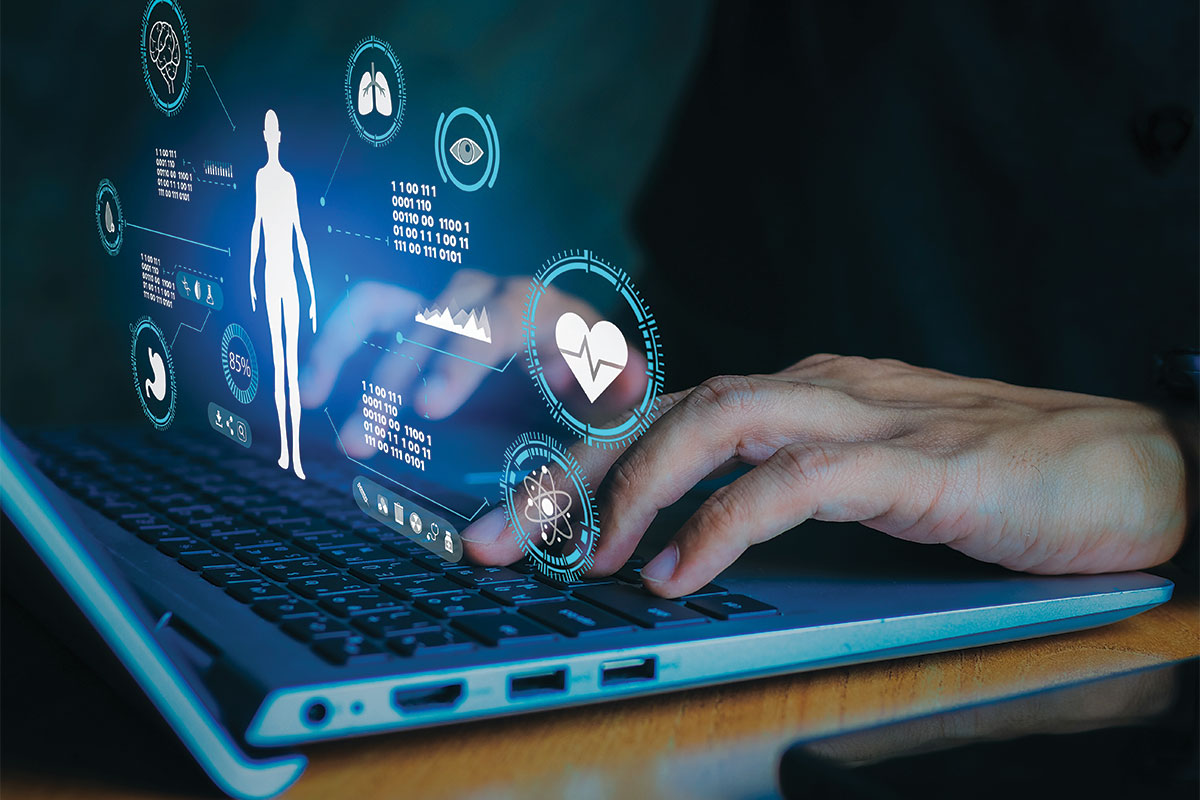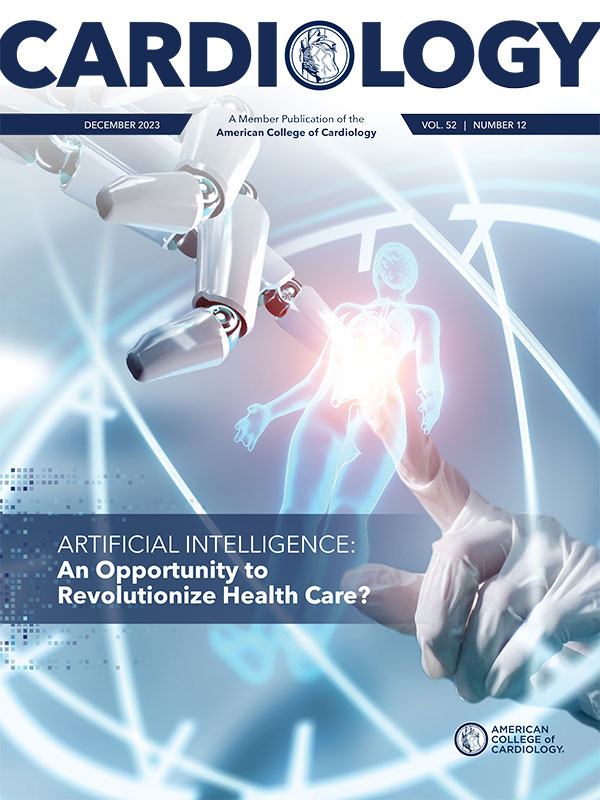Cover Story | Artificial Intelligence: An Opportunity to Revolutionize Health Care?

Artificial intelligence (AI) is taking the world by storm. "The ACC is actively working at the forefront of AI, with a focus on education, improving access to health care and ensuring that novel technologies achieve better patient outcomes, reduce administrative effort and extend the reach of our global workforce," says ACC's Chief Innovation Officer Ami B. Bhatt, MD, FACC.
"As we think about its uses in health care, it is essential for clinicians, administrators, patients and others involved in care delivery to create a framework for how we will use AI and an infrastructure upon which to start to deploy these technologies into our clinical workflow. Done thoughtfully, we will serve our patients better, educate ourselves optimally and improve the quality of work in the practice of medicine," she adds.
Countless industries like manufacturing, transportation and finance are already leveraging AI to aid with optimizing systems and processes, with health care increasingly not far behind. The potential uses for AI in health care are vast, whether to enhance diagnostics and treatment, increase operational efficiency and, most importantly, improve patient outcomes.
However, it is essential that all stakeholders are actively involved in developing a framework and infrastructure that ensures AI is deployed ethically, responsibly and in a manner that helps, not harms, patients and clinicians alike.
AI 101
AI Uses in Health Care Today
- Medical Imaging and Diagnostics
- Medical Research and Drug Discovery
- Telemedicine and Remote Monitoring
- Wearable Devices
- Robot-Assisted Surgery
- Virtual Health Assistants and Chatbots
- Simulated Training
AI in its simplest form is defined as a machine's ability to replicate tasks associated with human cognition.1 AI algorithms and systems can learn, reason, solve problems, perceive, understand natural language and even interact with their environment.2 There are several categories of AI, with machine learning among the most recognized, especially in medicine.
Machine learning involves algorithms that enable computers to recognize patterns and generate predictions based on data. For example, Facebook (now Meta) helped popularize machine learning technology for image detection, in which a user could upload a photo and automatically receive suggestions to tag others who may be in the image based on recognizing prior images.3
Taking machine learning one step further, deep learning uses neural networks based on how humans process information to analyze and process larger data sets. For example, companies like Amazon leverage neural networks based on a person's likes, dislikes and shopping and browsing histories to create individualized recommendations for products or services a person may be likely to buy.4
Deep learning has been particularly successful with both generative AI and speech recognition. With speech recognition, a technique known as natural language processing (NLP) uses neural networks to understand and reproduce language, which until now has been notoriously difficult to describe as binary code given the many idioms, expressions and variations in sentence structure across dialects and languages.5,6
With generative AI, an image can be created based on an algorithm's interpretation of both prior data and user request and continue to adjust the result based on user input. For example, DALL-E,7 an image generator made by OpenAI, can create a digital image based on a text prompt and continue to refine or correct the image based on iterative feedback.
AI in Health Care
These applications of AI have started to have a significant impact on medicine and the capacity to expand care for patients. To date, AI is being used for medical imaging analysis, aiding in drug discovery and analysis, telehealth, remote monitoring, robot-assisted surgery, personalized medicine, and even predictive analytics for patient outcomes.
Moderna is one recent example. The company had already built and implemented AI software that ended up being critical in rapidly creating and testing mRNA sequences to counteract the COVID virus, as well as automating regulatory processes during vaccine studies.8
Across both dermatology and pathology, clinicians are using AI-enabled image recognition software to quickly assess skin lesions and concerning cellular findings, respectively.9,10 Within ophthalmology, AI tools have been deployed globally to help increase screenings for diabetic retinopathy and acute macular degeneration.11
Radiologists have also been integrating AI to expedite their workflow and assist with image evaluation. In a recent study, MRI scans of the brain were evaluated by a machine learning algorithm, which was able to detect and classify malignancy with greater than 98% efficacy.9
These examples are only small snapshots of how AI is being used across the health care spectrum. They also represent only a small fraction of the potential uses and future integration of AI in medicine. The ability to be on the front-end of shaping how AI is used in medicine and, more importantly, cardiology is within our grasp.
AI and the ACC

Effective and safe adoption and integration of AI in a way that improves efficiency of care, patient-clinician interactions and ultimately cardiovascular outcomes is an important focus of ACC's Innovation Program and the College more broadly.
To date, the ACC Innovation Program team has been working with a wide variety of start-up companies, industry stakeholders and others to define best practices and help clinicians effectively implement AI solutions into their practice.
At the same time, the College has also incorporated AI-technologies like virtual reality, simulations and gamification over the years at many of its live international regional conferences, as well as its Annual Scientific Session.
Exciting opportunities are on the horizon to further incorporate these elements into ACC.24 in Atlanta, as well as competency-based education and certification efforts.
Click here to learn more about the Innovation Program.
Click here to see what's on deck for ACC.24. The site is being updated frequently as education and programming are finalized. Advance registration runs from Nov. 30 to March 6.
AI and Cardiology
Within the practice of cardiology, there are four key areas where AI has the potential to aid in transforming cardiovascular care and improving heart health: optimizing administrative processes; accelerating the dissemination of new science and research; fostering patient engagement and improving outcomes; and enhancing clinician education.
"Recent AI advancements have a chance to revolutionize cardiovascular care," says Pierre Elias, MD, FACC. More than 500 clinical AI algorithms have been approved by the U.S. Food and Drug Administration (FDA), he notes, with 10% focusing on cardiovascular applications, highlighting AI's growing importance.
These innovations automate measurements, enhance image quality and detect diseases using novel methods. Applications span wearables, electrocardiograms, echocardiography, angiography, genetics, and more. Generative AI, like fine-tuned medical language models and vision-to-language models, can streamline study reporting and reduce clinician burnout."
Lessening the Burden
In the administrative arena, AI can lift the burden of routine tasks and sharing information, the veracity of which can be easily verified by the clinician.12 Enabled by large language models (LLM) and NLP, note-taking can be automated for office visits, procedures, imaging reporting templates and more.
Ambient clinical documentation is becoming available, where an AI-based tool "listens" to clinician-patient conversations and converts voice to text to create a note in the electronic health record (EHR) for clinician review later. In a similar fashion, chatbots can automate routine nonclinical communication with patients, such as appointment coordination and responses to messages.
AI can also assist with improving workflows and systems within practices, hospitals and health systems, helping to maximize the skills and time of both administrative and clinical staff, reduce errors and minimize shortages and waste. For example, AI can be used to automate and streamline billing and EHR management. Predictive analytics can also be employed to optimize scheduling, exam room or bed allocations, and inventories of medications and supplies.
Spreading the Word
When it comes to wider and quicker dissemination of cardiovascular research, generative AI can help to synthesize information within multiple articles, providing high-level summaries of a few sentences or more detailed summaries. Determining trends gets a lift too with AI assessing preprints and self-published content, allowing educators and publishers to understand and meet the needs of their audiences.
Research can also be fueled, for example, through the use of machine learning for pattern recognition to facilitate hypothesis generation. In addition, we can ensure clinicians and researchers have access to up-to-date science and knowledge by exposing LLM to the content in scientific journals like JACC, as well as recent science not already available in public models of generative AI such as ChatGPT.
"The list of AI technologies to assist authors in improving the preparation and quality of their original manuscripts submitted to journals is increasing markedly," said Valentin Fuster, MD, PhD, MACC, et al., in a recent JACC: Advances editorial.13 "[This] exponential increase in the variety and applicability of AI-assisted research will result in currently unforeseen risks as well as benefits. Thus, journals will have to establish appropriate mechanisms to ensure that the core integrity and quality of underlying scientific publications remains robust." Click here to read the full editorial.
Improving Outcomes
Improving the health of patients is one of the biggest potential benefits of AI. "Clinical decision-making supported by AI can help to ensure the use of guideline-directed therapy by suggesting optimal adjustments to medical regimens for individual patients," says Katie Berlacher, MD, MS, FACC, who adds this could also be an assist in efforts to improve health equity.
AI-powered systems have the ability to aid in early detection of cardiovascular disease and related risk factors based on factors like family history, lifestyle, genetics, where patients live, etc. Similarly, AI can analyze vast amounts of patient data to identify patterns and predict patient responses to different treatments.2 This personalized approach can help with tailoring treatment plans and optimizing drug therapies for individual patients.
Patient education also has a role to play in improving patient outcomes. AI, if done correctly, has the potential to help reach individuals around the world with targeted education and resources to make healthy lifestyle choices, understand their respective disease(s) and/or risks, and/or engage with their health care providers in decision-making.
Innovating Medical Education
AI also has several potential applications for medical education, including providing personalized and adaptive learning experiences based on the preferences, needs and performance of individual learners.
New ways of teaching and learning using simulations, virtual reality, chatbots and gamification are already in use, but can be leveraged even further, especially when combined with NLP and data analytics. Techniques like automated scoring and adaptive response questions can further enhance the efficiency and effectiveness of assessments and feedback.
Additionally, medical schools and societies like the ACC can use AI to help identify learning gaps, provide targeted guidance and encourage collaboration among peers and/or mentors. Platforms like ChatGPT can also be used to inform the design of courses and evaluations.
"Available medical knowledge exceeds the organizing capacity of the human mind, yet medical education remains based on information acquisition and application," wrote Steven A. Wartman, MD, PhD, and Donald Comb, PhD, in a 2019 AMA Journal of Ethics editorial.14 "Thus, an overhaul of medical school curricula is due and should focus on knowledge management (rather than information acquisition), effective use of AI, improved communication, and empathy cultivation."
What's Next?
What does an effective AI framework look like? Elias suggests five key steps that are crucial to effectively integrating AI into medicine.
Data Quality and Accessibility: Health care organizations must have access to high-quality, standardized data. Data interoperability and sharing agreements among institutions are essential.
Clinician Training: Training and education of health care professionals about AI technologies and their role as tools in enhancing decision-making rather than replacing human expertise are essential. Ensuring clinicians are prepared to adapt to the inevitable future waves of technologies and change is also necessary.
Start Small: The best AI solutions are those that start small, are clearly defined and are designed to address well-defined problems. Starting small allows opportunities to learn from both mistakes and successes before attempting to scale a project more widely.
Regulatory Compliance: Staying updated on evolving regulations related to AI is key to ensuring compliance and safety. The FDA's guidelines for AI in health care are an example of recent governmental efforts to navigate the growing AI footprint. Click here for the full document.
Ethical Considerations: It is imperative that AI systems are ethically and transparently managed to maintain patient privacy and trust. The health care community and entire House of Medicine must work together to implement strategies that mitigate bias and ensure equitable health care for all.
Cardiology has always been a field on the leading edge of innovation – harnessing the latest and greatest technologies to improve the lives of patients whether in the cath lab or at the bedside. The new frontier of AI is no different. Employed creatively while recognizing its limitations, there is no doubt that AI can help us move closer to our vision of a world where science, knowledge and innovation optimize patient care and outcomes.
Hot Off the Presses
New research on AI and health care was the focus of a dedicated late-breaking science session at AHA 2023 in Philadelphia in November. Key highlights of the research which focused on the use of AI at the bedside include:
- Improved detection of pregnancy-related cardiomyopathy among nearly 1,200 pregnant and postpartum individuals in Nigeria. The SPEC-AI trial found AI-guided screening using a digital stethoscope was effective and resulted in double the number of cases identified, suggesting that up to half are likely missed with usual care, according to researchers, who noted this proactive approach would lead to prompt appropriate management and reduce associated disease and death.
- A smartphone app leveraging novel speech analysis technology to detect early signs of worsening heart failure (HF), including impending decompensation, was 71% accurate in detecting HF events about three weeks in advance, according to results in 400 adults with HF in Israel in the SPEECH trial.
- AI technology paired with EKG testing reduced the time to diagnose and transfer people with STEMI to the cardiac catheterization laboratory by about 10 minutes. The AI-enabled EKGs accurately diagnosed STEMI patients with a positive predictive value of 88% and negative predictive value of 99.9% in approximately 43,000 patients in a hospital in Taiwan in the ARISE trial.
- AI-driven assessment of perivascular fat to predict inflammatory risk as part of routine CCTA accurately predicted fatal and nonfatal cardiac events, independent from clinical risk scores and CT interpretation. The ORFAN trial showed that the new AI-driven risk classification, which accounted for coronary inflammation, plaque and risk factors, reclassified about 30% of patients to a higher risk category and about 10% to a lower risk category, represents a major step towards personalized medicine.
Access ACC's full coverage from the entire meeting at ACC.org/AHA2023.

References
- Mckinsey & Company. What is AI? April 24, 2023. Available here. Accessed Nov. 11, 2023.
- Xu Y, Liu X, Cao, et al. Artificial intelligence: A powerful paradigm for scientific research. The Innovation 2021;2:100179.
- Dwoskin E, Harwell D. (2021). Facebook is ending use of facial recognition software, deleting data on more than a billion people. Nov. 2, 2021. Washington Post. Available here.
- AWS. What is Deep Learning? Available here. Accessed Nov. 11, 2023.
- Deloitte. Connecting meaningfully in the new reality. 2022. Available here. Accessed Nov. 11, 2023.
- IBM. What is Natural Language Processing? Available here. Accessed Nov. 11, 2023.
- OpenAI. DALL-E2. Available here. Accessed Nov. 11, 2023.
- Sharma A, Virmani T, Pathak V, et al. Artificial intelligence-based data-driven strategy to accelerate research, development, and clinical trials of COVID vaccine. Biomed Res Int 2022:7205241.
- Haq Amin UI, Li JP, Khan S, et al. DACBT: Deep learning approach for classification of brain tumors using MRI data in IoT healthcare environment. Sci Rep 2022;12(1):15331.
- Nichols JA, Chan HWH, Baker MAB. Machine learning: applications of artificial intelligence to imaging and diagnosis. Biophys Rev 2019;11:111-8.
- Honavar SG. Artificial intelligence in ophthalmology-Machines think! Indian J Ophthalm 2022;70(4);1075.
- Glover WJ, Li Z, Pachamanova D, et al. The AI-enhanced future of health care administrative task management. NEJM Catalyst 2022;2022;March 3.
- Fuster V, Bozkurt B, Chandrashekhar Y, et al. JACC Journals pathway forward with AI tools: The future is now. JACC Adv 2023;2:100296.
- Wartman SA, Combs CD. Reimagining medical education in the age of AI. AMA J Ethics 2019;21:e146-52.
Keywords: ACC Publications, Cardiology Magazine, Artificial Intelligence, Precision Medicine, Telemedicine, Health Services Accessibility, Biomedical Technology
< Back to Listings


